Join the Fight for Justice
"Equal Justice under the law is not merely a caption on the facade of the Supreme Court building; it is perhaps the most inspiring ideal of our society. It is one of the ends for which our entire legal system exists it is a fundamental that justice should be the same, in substance and availability, without regard to economic status." U.S. Supreme Court Justice Lewis Powell, Jr.
Imagine having your home taken away, your children taken away or being a victim of domestic violence and having no constitutional right to a lawyer. This is the reality facing thousands of low-income people in Louisiana who can't afford a lawyer. The constitutional guarantee of a lawyer does not apply to people fighting civil injustices - essential matters of personal safety, economic security and family support that can threaten basic survival.
Civil legal aid helps people solve critical, life changing problems. It provides free legal assistance to those who would otherwise go unrepresented. The help provided by civil legal aid programs supports the American core value of equal access to justice. Organized measures to protect the poor in civil legal matters originated in 1903 with the Legal Aid Society of New York. As recent as September 2014, Justice Antonin Scalia noted, "Equal access to justice is a fundamental ideal." Today, those measures to protect the poor are provided by civil legal aid programs. Because of challenging economic times and Louisiana's high poverty rates, civil legal aid programs are struggling to provide these essential services - barely meeting a third of the poverty population's needs.
One in 5 Louisianans — an estimated 918,187 people, or 20.2 percent of the population — lived in poverty in 2016, the second-highest rate among all states. Of those living in poverty, more than 147,000 will go without legal assistance because they are unable to pay for or obtain legal representation. The American Bar Association estimates that low-income households face an average of 1.1 legal problems annually. To fully serve all Louisiana households in poverty, the Louisiana Campaign to Preserve Civil Legal Aid calls for funding a network of local and community based service components that include:
- Significantly increasing full-time staff attorney positions at civil legal aid offices;
- Hosting AmeriCorps Attorney positions at civil legal aid offices to collaborate with the four law schools leveraging law student participation in the delivery of civil legal aid through clinics;
- Placing pro bono young lawyers within each Louisiana judicial district courthouse to assist with direct client advice, referral and case placement services;
- Establishing community self help centers and kiosks employing young lawyers and/or legal coordinators within each parish to provide court approved forms, guidance, and legal aid services information;
- Developing the statewide hotline call center to utilize attorneys, law students and client intake positions to provide information, referral and handling of brief service matters.
In addition to being an essential element of the justice system, civil legal aid provides substantial economic benefits. The Louisiana Bar Foundation funded an Economic Impact and Social Return on Investment Analysis for fiscal year 2016 for the Access to Justice Commission. The Analysis found that for every $1 invested in Louisiana's civil legal aid services, these programs deliver $8.73 in immediate and long-term consequential financial benefits. The total net social return on investment for Louisiana's civil legal aid programs during the 2016 fiscal year was 873%. The civil legal aid organizations provided assistance in 26,437 legal matters consisting of over 100 types of civil legal problems including family law, housing, healthcare, public benefits, consumer protection, community support issues, government and legal system issues. The net economic impact value resulting from Louisiana civil legal aid activities during the year totaled $93,977,000. The Analysis shows that dollars spent on Louisiana's civil legal aid providers are well spent and deliver unmistakable economic returns to the state.
Civil legal aid saves taxpayer dollars by:
- keeping families together;
- reducing domestic violence;
- helping children leave foster care more quickly;
- reducing evictions;
- increasing access to benefits;
- helping communities devastated by natural disasters, and
- offering indigent citizens a way out of poverty.
Investing in civil legal aid is a powerful way to help people solve critical problems and prevent events that are harmful and expensive for society. Civil legal aid opens doors to the justice system and provides reinvestment in the community. Funding for civil legal aid will have a ripple effect, impacting not only the families served, but the community at large. Schools, businesses, government agencies and the state as a whole benefit from resolving civil legal problems.








